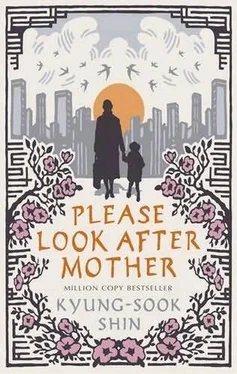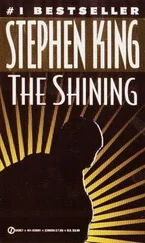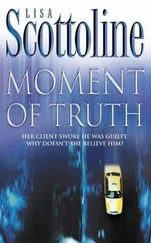A week?
Not knowing what to make of what the woman told him, he continues to give out flyers after she has left. His entire family has posted flyers and distributed them everywhere, from Seoul Station to Namyong-dong, from restaurants and clothing stores to bookstores and Internet cafés. When the flyers were torn off because the family had posted them in a place they weren’t supposed to, they reposted them in the same place. They didn’t limit it to the area around Seoul Station, either, but handed out and posted flyers in Namdaemun, Chungnim-dong, and even in Sodaemun. They didn’t receive a single phone call from the ad they had placed in the newspaper, but some people did call after seeing the flyers. They received a tip that someone like Mom was at a restaurant and rushed over, but it wasn’t her; it was a woman around Mom’s age who worked there. Once, a caller said that he had invited Mom into his house, and carefully spelled out his address on the phone; filled with expectation, they ran over there, but the address itself didn’t exist. There was even someone who said that he would find Mom for them if they would pay him the five-million-won reward up front. But even these calls became sparse after about two weeks. The members of his family, who had rushed around with hope-filled hearts, would often find each other sitting at the base of the Seoul Station clock tower, dejected. When people crumpled the flyer as soon as it was handed to them and threw it on the ground, his younger sister, the writer, picked it up, smoothed it out, and gave it to someone else.
His sister, who came to Seoul Station with an armful of flyers, stands next to him. Her dry eyes glance at his. He relays the woman’s words and asks, “Should we go to the Yongsan 2-dong office and look around?” His sister asks, “Why would Mom go there?” Looking despondent, she says, “We can stop by later,” and, addressing the people brushing past them, says loudly, “It’s our mom-please take a look at it before throwing it away,” and hands out flyers. Nobody recognizes his sister, whose picture is sometimes featured in the daily paper’s culture section when she publishes a new book. It must be more effective to combine yelling and giving out flyers, as his sister does. People don’t throw away her flyers as soon as they turn around, the way they do with his. There aren’t many places Mom might go to, other than his siblings’ houses. This is the root of his and his family’s agony. If Mom had some places she might head for, they would focus their search there, but because there isn’t any such place, they have to comb the whole city. When his sister asked, “Why would Mom go there?” he didn’t immediately realize that his first job in this city had been at the Yongsan 2-dong office. Because that was thirty years ago.
The wind has turned cool, but beads of sweat dot his face. He’s a few years past fifty, a marketing director for a developer of apartment buildings. Today, Saturday, is not a workday, but if Mom hadn’t gone missing he would be at the model house in Songdo. His company is recruiting last-minute buyers for units in a large apartment complex there, which will soon be completed. He’s worked day and night to reach 100 percent occupancy. All through the spring, he was in charge of the ad campaign and worked on selecting an ordinary housewife as the model, instead of going for the typical professional. During that time, he never got home before midnight; he was so busy with the construction of the model house and wining and dining journalists. On Sundays, he would often escort the CEO and other executives to golf courses in Sokcho or Hoengsong.
“Hyong-chol! Mom’s missing!” His younger brother’s urgent voice on a midsummer afternoon created a fissure in his daily life, shattering it as if he’d set foot on thin ice. Even as he heard that Father and Mom had been about to get on the subway heading for his brother’s house, but that the car had left with only Father aboard, leaving Mom behind in the station, and that she couldn’t be located, it didn’t occur to him that this would lead to Mom’s disappearance. When his brother said that he’d called the police, Hyong-chol wondered whether he was overreacting. Only after a week passed did he put an ad in the paper and call emergency rooms. Every night, they split up into teams and visited homeless shelters, to no avail. Mom, who had been left behind at Seoul Station, disappeared as if she were a figment of a dream. No trace of her remained. He wanted to ask Father whether she had really come to Seoul. Ten days passed since her disappearance, then two weeks, and when it became almost a month, he and his family fumbled around in confusion, as if they had all injured a part of their brains.
He hands his flyers to his sister. “I’m going to check it out.”
“You mean Yongsan?”
“Yeah.”
“Do you have a hunch?”
“It’s the first place I lived in when I came to Seoul.”
He tells his sister to check her cell phone often, that he will call her if he discovers anything. These are unnecessary words at this point. His sister, who never used to answer her phone, now picks up before the third ring. He walks toward the line of taxis. Mom worried about his sister Chi-hon, who is in her mid-thirties but is still unmarried. Sometimes Mom called him in the early morning and fretted, “Hyong-chol! Go over to Chi-hon’s; she’s not answering the phone. She’s not answering, and she’s not calling me, either-I haven’t heard her voice in a month.” When he told Mom that Chi-hon would be holed up at home, writing, or that she must have gone somewhere, Mom insisted that he go over to his sister’s apartment: “She’s alone. She could be sick in bed, or she might have fallen in the bathroom and can’t get up…” When he listened to the string of mishaps that might occur to someone living alone, he would be swayed into thinking that any of those things could really happen. Before work or during lunch, he would stop by his sister’s apartment at Mom’s urging and see a heap of newspapers at her door, signaling Chi-hon’s absence. He would gather the newspapers and shove them into a garbage can. When he didn’t see any papers or milk delivered at her door, he would keep pressing the doorbell, knowing that she was inside, and she would poke her unkempt face out and grumble, “What now?” Once, when he was ringing her doorbell, a man arrived, seemingly to visit Chi-hon. The man even said hello to him, awkwardly. Before Hyong-chol could ask who he was, the man said, “You look so much like Chi-hon that I don’t even need to ask who you are.” The man said he’d come by because he had suddenly stopped hearing from her. When Hyong-chol told Mom that his sister seemed to have gone on a trip, or that she was at home and she was fine, Mom would sigh and say, “We won’t know about it even if she dies.” Then she would ask, “What is it exactly that she does?” His sister wrote novels, and to do this she would disappear for fifteen days or sometimes even a month. When he asked her, “Do you have to do that when you write?” she would mumble, “Next time I’ll call Mom.” That was it. Even though Mom was like that, the chasm between the family and his sister continued. Mom stopped asking him to go check on Chi-hon after he ignored her requests a few times. She only mentioned once, “I guess you don’t have time to listen to me.” Because his sister’s abrupt silences continued, he figured someone else in the family must be doing Mom’s bidding. After Mom went missing, his sister muttered to him, “Maybe I’m being punished…”
There is a lot of traffic between Seoul Station and Sook-myung Women’s University. He looks out the car window at the towering gray buildings. He carefully inspects people walking by. In case Mom is in the crowd somewhere.
Читать дальше











